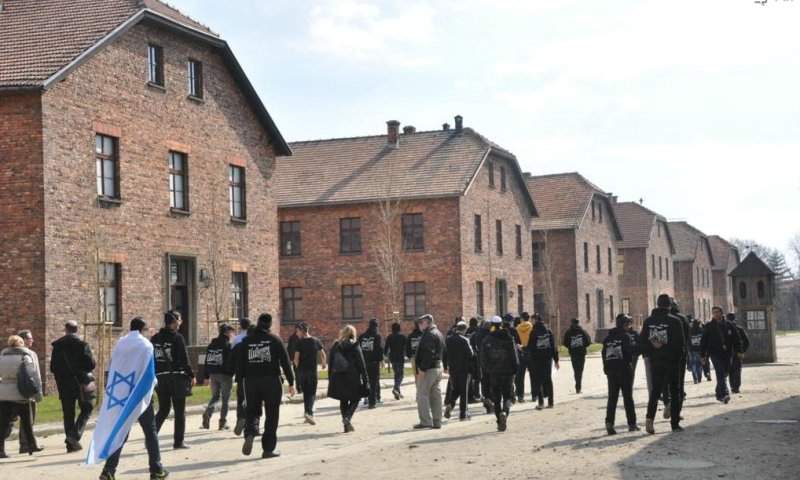
Second robbery of lost Jewish property in Poland
Investigation by Forbes follows the process of restoration of Jewish property, which is partly done by gentiles and finds its way to questionable places
- Avi Glick, Behadrey Haredim
- כ"ה תשרי התשע"ד

Young Jews in Poland. Photo: Uzi Barak
Forbes reveals a real scandal in the conduct of CEOs and fund managers of the return of Jewish property in Poland. A comprehensive investigation revealed that former gentiles who have undergone a 'name change' just as the Haredi Simcha Keller, who sits on the board of ZGWZ and simultaneously serves as chairman of the Jewish community in Lodz, who is in fact Jerzy Skobronsky. Or director of the Jewish cemetery in Warsaw, Israel Spielman, whose original name is Parazmilab Ziska, are the major claimants of property restitution.
According to Forbes, "the Jewish communities in Poland have already returned about 500 properties. Much of this unique real estate (synagogues, slaughterhouses, mikvehs and cemeteries) has been sold, often well below market price, and the money - instead of being used to foster the Jewish heritage of Poland - was eventually reached the sophisticated distribution mechanism. It was distributed within an impenetrable network made up of United Jewish Communities in Poland and the Foundation for the Preservation of Jewish Heritage."
What happens with these assets? Forbes explained: "Although according to Jewish law cemeteries are sacred forever, plots which were separated from Jewish cemeteries were offered for sale, for example, in Torun, Lublin or Gliwice. Prices associated with these transactions are hidden in the accrued annual data provided by the ZGWZ.
"Jewish communities also sold part of Jewish heritage. That's what happened to the well-preserved synagogue in Lubraniec (for the price of U.S. $158,000), to the neo-classical hospital in in Siedlce (for the price of U.S. $193,000) or the Beis Midrash in Sokolow Podalski, refurbished before being sold (at $ 32,000). Leaders of Jewish communities in Poland are not ashamed of it. Michael Shudrich, Chief Rabbi of Poland, is not ashamed either. Despite his status, he must agree to the sale of religious buildings".Where does the money go?
Forbes also examined where the money goes to, and the results speak for themselves:
"You can see the rewards program for the return of property as an advanced method to "empty" the properties which were restored by the Jewish community. The first step involves filing a request to the regulatory commission. Requests were prepared by attorney offices that received approximately 158 thousand dollars for a single document. However, lawyers have become marginal when the process entered its second phase, namely mediation before the regulatory commission. The ZGWZ board appointed its people to this mission and paid them a lot more. Trouble fees were 1% of the value of the property returned (real estate, alternative lots, compensation).
"It is easy to calculate the amount of money received in the case of the old hospital in Laszano street in Warsaw which was returned (valued at $ 6.3 million) , or in the case of dormitories on Parzemyska street in Krakow (estimated value $ 3.2 million). Pioter Ritka - Sandberg, an expert on restoration of properties in ZGWZ, Michel Samet, chairman of the Jewish community in Gadansk, and Alicia Cobos, president of the branch of ZGWZ in Poznan, were part of a closed circle of Realtors. All hold senior positions in the Fund for the Preservation of Jewish Heritage in Poland.
"Jewish community leaders of today have not abandoned further opportunities to ensure private profits restitution of Jewish communities in the past. Footprints can be found in the files of one of the claims, which were filed by the City of Warsaw against the former employee. The defendant testified that the house of Peter Kadaltzik was equipped with a modern central heating at the cost of $ 6,300 from funds which were restored. Other information comes from the Southern Courier newspaper that his system is in Piaseczno, who described how Rafael Kadaltzik and his friend opened a cafe called "Bar Mikveh" in a historic religious bathhouse in Piaseczno. The article did not include information that Kadaltzik is the son of the head of one of the most important Jewish organizations in Poland.
"Jewish communities also sold property at a price lower than its market value. For example, the Warsaw Jewish community sold a synagogue in Otwock, while a very similar property located very close to the synagogue was purchased by the same company, PHU Stok, for almost double the price, but not from the Jewish community."
תגובות
{{ comment.number }}.
הגב לתגובה זו
{{ comment.date_parsed }}
{{ comment.num_likes }}
{{ comment.num_dislikes }}
{{ reply.date_parsed }}
{{ reply.num_likes }}
{{ reply.num_dislikes }}



הוספת תגובה
לכתבה זו טרם התפרסמו תגובות